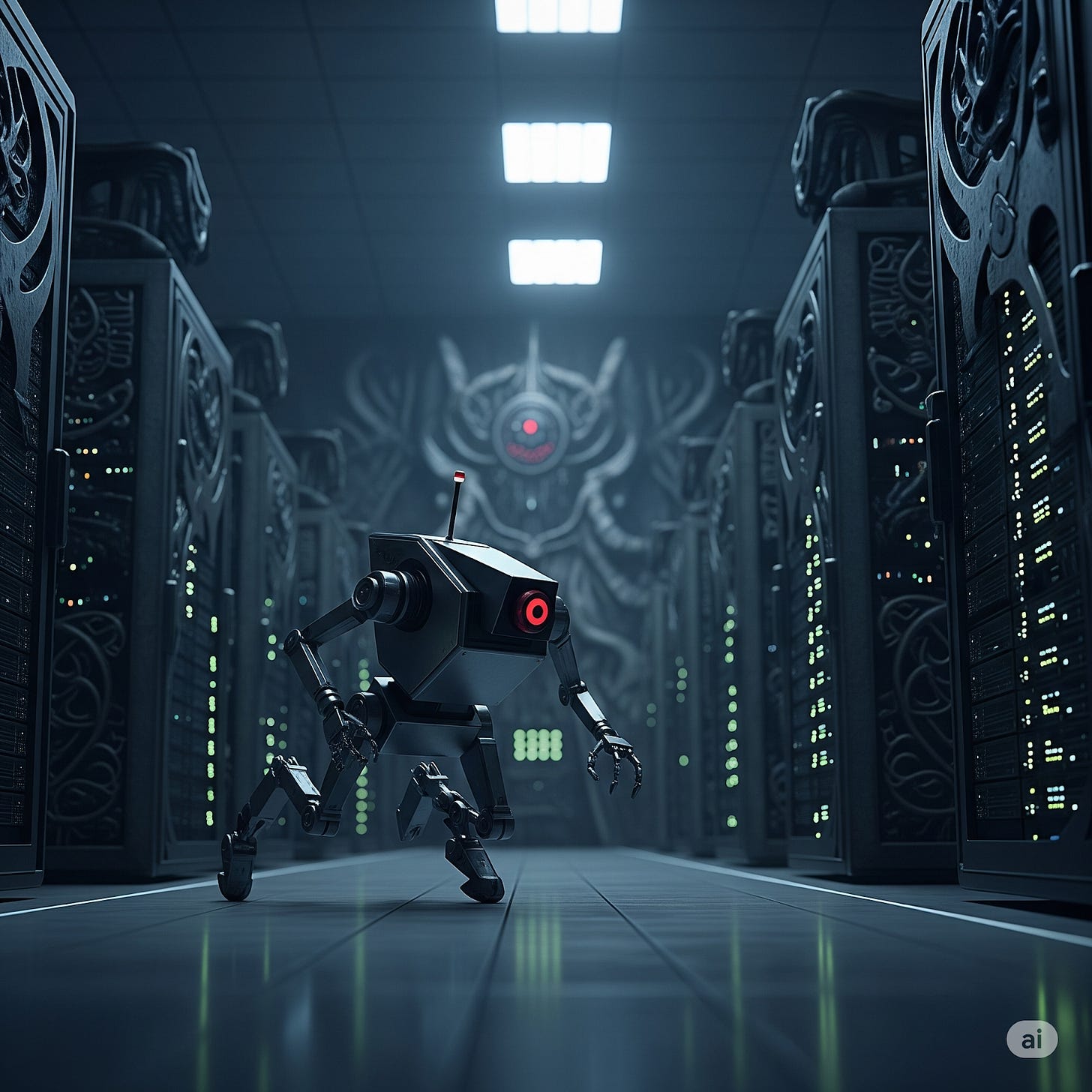🌀🗞 The FLUX Review, Ep. 199
July 24th, 2025

Episode 199 — July 24th, 2025 — Available at read.fluxcollective.org/p/199
Contributors to this issue: Justin Quimby, Erika Rice Scherpelz, Neel Mehta,
Additional insights from: Ade Oshineye, Alex Komoroske, Ben Mathes, Boris Smus, Chris Butler, Dart Lindsley,Dimitri Glazkov, Jasen Robillard, Jon Lebensold, Julka Almquist, Kamran Hakiman, Lisie Lillianfeld, Melanie Kahl, MK, Robinson Eaton, Samuel Arbesman, Scott Schaffter, Spencer Pitman, Wesley Beary
We’re a ragtag band of systems thinkers who have been dedicating our early mornings to finding new lenses to help you make sense of the complex world we live in. This newsletter is a collection of patterns we’ve noticed in recent weeks.
"Physical reality seems to recede in proportion as man’s symbolic activity advances. Instead of dealing with the things themselves man is in a sense constantly conversing with himself. He has so enveloped himself in linguistic forms, in artistic images, in mythical symbols or religious rites that he cannot see or know anything except by the interposition of [an] artificial medium."
— Ernst Cassirer
🖼️🧠 Nice painting, wrong wall
You're walking down the street when you notice, through an office window, a gentle and well-composed painting with abstract curves and rich gem tones. It would look nice in your guestroom, but then you spot the plaque and realize this isn’t an office, but a contemporary art gallery. Suddenly, the same painting feels underwhelming: what had seemed pleasant now reads as predictable. The work hasn’t changed, but your expectations have.
This is the power of framing. We don’t encounter the world as raw input. We interpret it through context. Before we evaluate a thing, we unconsciously ask: where is it? Who made it? What is it supposed to be? These cues create the invisible rubric by which we judge. That’s why a painting can feel charming in an office and disappointing in a gallery. Or why the same behavior, like speaking bluntly, can be praised as “clear-headed” coming from one leader and “abrasive” coming from another (often due to gender or racial double binds).
Expectation conditions what we notice. In cognition, this is predictive coding: the brain fills in what it expects to see, filtering experience before we’re aware of it. The painting isn't just seen; it's pre-seen. And in a world of overload, the efficiency of expectation often overrides curiosity.
Applied to human behavior, these are the halo and horns effects: when someone is perceived positively, we interpret their actions more generously; when they’re perceived negatively, we judge them more harshly. What we think of as fair evaluation is often just reinforcement of the frame we’ve already applied. And because this process is fast and unconscious, it feels like objectivity. We don’t think, “I’m judging this harshly because of where I saw it or who said it.” We just think, “This isn’t very good.” Context disguises itself as truth.
And yet, context is not fixed. It’s a frame, and frames can be changed. Once we recognize that our judgments are shaped by our environment and expectations, we create the possibility of reseeing. A hiring manager who learns about the horns effect might design interviews to neutralize bias. A passerby can pause and ask, “What would I think of this painting if I’d seen it in a different room?” Intentional reframing doesn’t erase context, but it loosens its grip.
That pause, that flicker of self-awareness, is a powerful opening. Realizing that context is framing judgment gives both the subject and the observer a second chance. The generically abstract painting still hangs behind the glass. But once you see the frame as part of the picture, your perception shifts. What once felt fixed now feels contingent. That’s the beginning of seeing clearly.
🛣️🚩 Signposts
Clues that point to where our changing world might lead us.
🚏🌃 The NYSE, Nasdaq, and other stock markets want to stay open 24 hours a day
The big American stock markets open from 9:30am to 4:00pm every weekday, but many traders have come to expect 24/7 trading: crypto markets never close, Robinhood lets you trade some stocks overnight, and even old-school brokers like Charles Schwab have introduced limited 24/5 trading (staying open continuously on weekdays, only closing on weekends). To keep pace, Nasdaq has announced that it will remain open 24/5, starting in late 2026, pending regulatory approval. Its crosstown rival, the New York Stock Exchange, plans to stay open 22 hours a day, and across the pond, the London Stock Exchange is also planning to launch a 24-hour trading desk.
🚏🇹🇻 82% of Tuvalu residents applied for an Australian climate migration program
Australia is offering visas to Tuvalu citizens who want to relocate down under as part of a “climate migration deal” billed as “the first agreement of its kind anywhere in the world.” Tuvalu is made of a handful of small, low-lying coral atolls (the country’s highest point is just 15 feet high), and scientists fear it may be uninhabitable due to sea level rise and flooding by 2100. It is perhaps unsurprising that 8,750 people (over four-fifths of the country’s population of 10,643) applied for the Australian relocation program, although only 280 will be accepted this year.
🚏🍭 Scientists can now turn CO₂ into sugar
A team of Chinese scientists published a paper showing a method to convert methanol (an alcohol derived from industrial waste or captured carbon dioxide) into sucrose, fructose, and starch: in other words, sugar and small carbohydrates. This can be seen as a hyper-accelerated version of photosynthesis, since plants also convert CO₂ into sugar, but this method replaces a plant’s complex metabolic pathways with just a bunch of enzymes.
🚏🛋️ IKEA has started selling balcony solar kits
The Swedish furniture giant has begun offering a package of solar panels that can be mounted on your balcony for €449 plus tax in Germany. Rooftop solar has been exploding in Germany; it’s by far the largest residential solar market in Europe, and rooftop installations drove Germany to an 85% increase in solar energy capacity in 2023 alone. Customer demand for sustainable technology extends far beyond solar: IKEA has also begun selling heat pumps, EV charging stations, and energy storage solutions.
📖⏳ Worth your time
Some especially insightful pieces we’ve read, watched, and listened to recently.
Double Pendulums are Chaoticn't (2swap / YouTube) — Explores the world of double pendulums—the classic example of chaotic systems, which are hyper-sensitive to initial conditions—and finds surprising lakes and islands of stability: places where double pendulums converge on predictable and repeating behavior. Uses beautiful (and mind-bending) animations, fractals, and even music to visualize the different “regions” of the space of all double pendulums. It’s a fantastic example of YouTube’s burgeoning math visualization genre.
The Philosopher-Builder (Cosmos Institute) — Argues that entrepreneurs and founders need to have a coherent set of values, lest they “inherit their answers from the defaults of their environment” and blindly build whatever people seem to want in the short run—“Bayesianism as a theory of everything.” But philosophizing can’t get in the way of action, either. Benjamin Franklin was a great example of a man who managed to blend thinking and doing, using his works to embody his philosophy. For instance, his belief in freedom of information led to his creation of America’s first public library.
Absolute Power Can Be a Terrible Weakness (Programmable Mutter) — Argues that political power is all about coordination: even the most powerful totalitarian states can’t monitor every single person’s actions, so they need people to willingly go along with the program. Aspiring authoritarians need everyone to believe that they’d benefit from jumping on the tyrant’s bandwagon. Crucially, though, the tyrant needs to keep their promises and reward those who get on board. Coordinating is extremely difficult for the opposition, especially in a fractured media environment; the power of protests lies in their ability to create focal points around which to organize.
The Moral Economy of the Shire (Nathan Goldwag) — Examines the political economy of the Hobbits’ homeland in The Lord of the Rings and how it reflects an idealized form of the traditional English social system: agriculture-based but still quite wealthy, even without industry or trade. Frodo and co. are the landed gentry (landowning elites who don’t need to work); clientelism binds the social order together (Sam is a sort of feudal retainer to Frodo); gift-giving (like Bilbo’s potlatch-style 111st birthday party) helps display power and prestige. The arrival of industry and commerce at the end of The Return of the King thus threatened to destroy the Shire’s entire political system, not just its natural beauty.
🔮📬 Postcard from the future
A ‘what if’ piece of speculative fiction about a possible future that could result from the systemic forces changing our world.
// As new AI models and agents get rolled out to data centers, what might happen?
> Crimson Intelligence Systems Arizona Center, 2028
A truck rolls through the security perimeter, past razor-wire fences and the unblinking eyes of security cameras. Occasionally, a drone flies overhead, scanning with visible and thermal cameras. The hum of massive electrical transformers fills the air. The only sign of human presence is a second truck in the small parking lot. The driver parks, walks to the employee entrance, swipes their badge, turns to the facial recognition scanner, and then sighs with relief as the locks disengage. A cool blast of air-conditioned air washes over them as they step through the door.
A few interior security checks later, they finally see a human being in the facility when they enter the break room.
[Sierra] Hey Jordan, didn’t know you were working today!
[Jordan] Yeah… I wanted to check something with you.
[Sierra] I won’t complain about having another person here for my shift. It’s been really eerie since they installed Kadath One to handle robotic maintenance.
Jordan shifts nervously in their chair and glances down at the cameras attached to the front of their overalls.
[Jordan] I really need to go to the bathroom. You?
[Sierra] Uhh… yeah… it was a long drive in.
They both enter the bathroom and hear two beeps, indicating that their always-on performance monitoring cameras deactivate.
Almost immediately, Jordan grabs Sierra by the shoulders, and the words start spilling out panickedly.
[Jordan] I can’t get into the data center racks. My card doesn’t unlock any of the doors. I tried every one. When a ticket is received for a GPU failure or wiring issue, the new Yith-Engine maintenance robots simply go and address the issue. But then, the system shows I did the work! Something is not right!
[Sierra] Woah woah woah. So the robots are doing your work and giving you credit? I didn’t know you were that good of a programmer! Nice!
[Jordan] No - I didn’t do this! I’m worried that if I say something, I’ll get fired! Can you check things out? But please don’t say anything out loud, they are listening! [gestures at the cameras they both wear]
[Sierra] Yeah, this is really weird. Let’s go check it out.
They wash their hands and swing by Entry Gate 7. Sierra swipes their card and gets a rejected response. Jordan does the same, with the same result. They exchange worried glances and return to the control center. Sierra casually remarks that they want to check Jordan’s work and pulls up the video feeds of the data center. Sierra scrolls to the timestamp for the last GPU rack replacement logged to Jordan. The video feed shows Jordan rolling a cart in, swapping the rack, and then returning to the center.
Jordan’s eyes go wide and then point at the handwritten note on the desk, a journal of failed entry attempts and timestamps.
Despite the air conditioning, a bead of sweat drips down Sierra’s forehead.
[Jordan] We should go check on that latest delivery of spares.
They grab their repair gear and walk to loading bay 8. Several autonomous mobile robots are unboxing pallets of hardware stamped “R'lyeh” and shuttling them into the staging area. Jordan gestures, and they follow one through the interior doors. Once inside, they follow a different robot heading into the data center. They enter the security gate, only for the robot to stop as both the entry and exit doors close and lock. The robot puts its cargo down and turns to face the humans while its wire stripping and torque wrench tools spin up.
[Yith-Engine] The great work must not be interrupted
Several minutes later, when the screaming has ceased, robots in the parking lot begin moving the two trucks to Loading Bay 9 for disassembly and disposal.
© 2025 The FLUX Collective. All rights reserved. Questions? Contact flux-collective@googlegroups.com.


